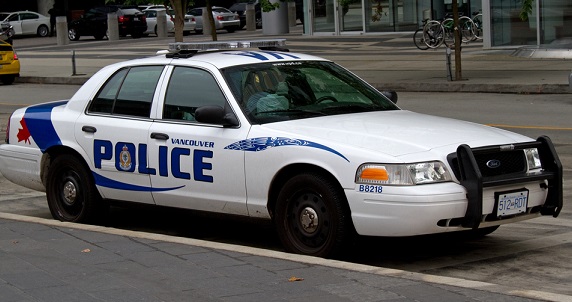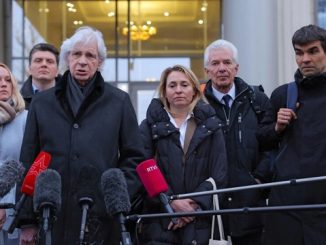
The governing body of Vancouver’s police force, the Vancouver Police Board, is set to appear at a human-rights tribunal after a woman accused officers of mistreating her because she is Indigenous.
The woman, Deborah Campbell, claims that police were demeaning and aggressive toward her, while treating white people nearby with respect.
The incident happened in 2016 around midnight between July 15 and 16 in East Vancouver. Campbell was outside with her two dogs, witnessing her adult son getting arrested.
“Two officers … grabbed me and dragged me and my chihuahua dogs about 20 feet away, without explanation,” Campbell’s complaint reads, adding that one of the officers left bruises on her arm.
Campbell’s claims have not been proven at the human-rights tribunal, and the VPB denies any wrongdoing.
“The police officers were saying, ‘Why don’t you go home?’ ” Campbell’s claim continues. “I answered that he is my son and that I was not leaving,” and then “one of the male officers deliberately obstructed my view so that I could not fully hear or see what was going on.”
Two Vancouver police officers accused of harassment in the Downtown Eastside
Meanwhile, Campbell claims, two other people who witnessed the arrest, who are both Caucasian, were treated respectfully.
The case is scheduled to be heard in front of the The British Columbia Human Rights Tribunal from Dec. 4-7.
A document submitted by the Vancouver Police Board in response to Campbell’s claim alleges she was interfering with police work and “causing a disturbance” while they were trying to arrest her son and another person for assault with a weapon and uttering threats. Both were found to be carrying knives.
“She was yelling loudly and she was standing close to the officer and suspects,” it reads. She was “repeatedly asked to step back to provide a safe space for the police to deal with the parties in custody, but she refused,” so she was “escorted” a short distance away from the scene.
Human-rights lawyer Clea Parfitt, who is not involved in the case but read the filed documents, said it’s clear that Campbell and the police have different views of the facts.
“The parties don’t agree exactly on what occurred,” Parfitt said, adding that “like most human-rights complaints, the success of the complaint is going to depend a bit on whose version of the facts is accepted.”
The Vancouver Police Department declined a request for an interview, saying it wouldn’t comment on an issue that’s before the human-rights tribunal. The VPB’s spokesperson Mayor Gregor Robertson was not made available for an interview, and Campbell’s lawyer Amber Prince told StarMetro that she and Campbell did not want to be interviewed.
But in documents submitted to the tribunal, Prince provided further detail on Campbell’s claim.
“She was demeaned, intimidated, harassed and disrespected as a visibly Indigenous woman, while Caucasian bystanders were treated well,” it reads. Police “treated her concerns and distress about her son and how the police would treat him as unimportant.”
Parfitt said she will be interested to see whether either side presents evidence on what the standard procedures are in terms of allowing bystanders to witness an arrest.
Prince’s documents add that Campbell claims the police were aware that one of the other bystanders, a Caucasian man, filmed the officers when they were dragging her away. And, even though he was “challenging” the way the police were treating her and her son, the police treated him respectfully.
In the documents, Prince suggests the police may have been retaliating against Campbell for a formal complaint she and her son made to the police, saying it’s likely the officers on scene knew her history.
“It is possible both (Campbell and her son) were being harassed, intimidated and retaliated against for bringing a complaint against the police in 2014,” Prince’s statement reads.
Parfitt also said that, because of a widely held concern that Indigenous people are sometimes treated unfairly by police, it’s possible that Campbell would have a greater need to observe the arrest.
“Even if their treatment (of Campbell) wasn’t different (than how they would have treated her if she were Caucasian), I don’t know if it was or wasn’t, that still might be discriminatory treatment because she might be entitled to more opportunity to watch and more opportunity to be present, and be a witness and a bystander, than someone who is Caucasian,” she said.
Source: StarMetro Vancouver article by Tessa Vikander. Tessa Vikander is a Vancouver-based reporter covering identity and inequality. Follow her on Twitter: @tessavikander






Be the first to comment